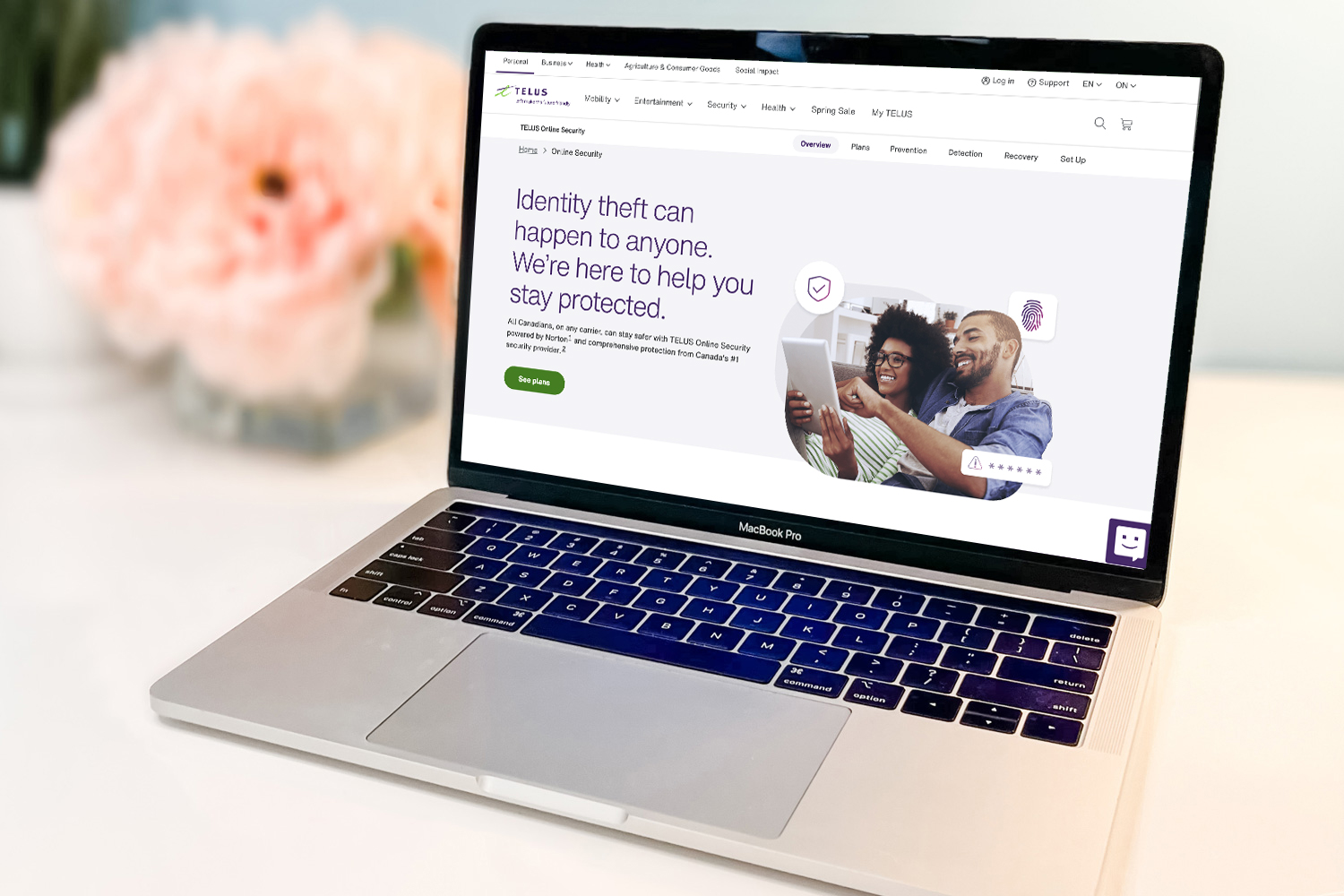We go about our daily lives sharing information freely and casually online — whether logging in and out of websites and apps, connecting to public Wi-Fi, banking, filling in surveys, and taking part in the latest social media trends — and that’s barely scratching the surface.
As our lives continue to become increasingly digital, our everyday actions can pose an increased risk to the security of our information and identities, especially during times like tax season when cybercrime is especially prevalent (you know those robocalls and phishing texts I’m talking about).
Cybercrime is on the Rise
I used to think I was just becoming more aware of cybercrime from reading the news more or knowing people in my circle who’ve experienced fraud, but then I saw the statistics. As reported by the Canadian Anti-Fraud Centre, 2022 was a historic year for financial losses due to cybercrime. $530 million was lost by Canadians from scams and fraud, an increase of 138% compared to 2021. It’s important to point out that it’s estimated that fewer than 5% of victims ever file a fraud report with the CAFC, so these numbers are significantly higher in reality. And in fact, this became even more real to me when I almost became a fraud victim.
How I Almost Became a Fraud Victim
Some of you may already know this because I posted it on my Instagram Stories last year, but I almost became one of those fraud victims. It was during the chaos of me moving into my new place and dealing with mail being sent mistakenly to our old place and redirected to a friend’s house.
During all this confusion, I received an email. It was from Canada Post (or so I thought) and it said I had a package at one of their facilities but the address on the package was too hard for them to read so they couldn’t verify who it was sent by. In order to fix this and for them to be able to send it to me, I needed to click a link in their email to talk with one of their chatbots. I did mindlessly, and then I was told I needed to provide them with some personal information, including my credit card number, and pay $5 to ship the package to me.
I know you may be reading this and thinking “Oh come on, that’s obviously a phishing scam!” But here’s the thing, I was busy, overtired from moving, and already dealing with misplaced mail. It made sense to me at the time, so I clicked on the link, put in my credit card info, and was just about to hit submit when a voice yelled in my head “Hey…wait a minute. Are you sure this is from Canada Post?”
There were tons of red flags I ignored because I was just on auto-pilot. I didn’t check the email address domain it was sent from. I also didn’t check the URL for the webpage it directed me to. I also didn’t even clue into the fact that the chatbot seemed a bit off in its responses. Luckily my intuition kicked in at the last second, and when I checked things over, it was very clear that I narrowly escaped being defrauded.
Another personal experience I’ve been dealing with since 2019 has been Instagram scams. But what’s different is I’m not the one being targeted, my followers are. I’ve probably reported 50 fake Instagram accounts in the last year that have impersonated me and have messaged my followers trying to phish for personal information and money under the guise of me offering cryptocurrency coaching (something I don’t do). And this hasn’t just happened to me. So many other influencers in the personal finance space have had this happen to them too.
This is just to say that these scammers are out there and they can target anyone. The good thing is, you can do something about it.
Types of Scams and Fraud
Before diving into how we can better protect ourselves from fraud, I think it’s important to understand what kind of scams and fraud are out there. These fraudsters are getting smarter and more tech-savvy, so it’s important to stay up-to-date on potential cybercrime.
In case you’re interested, CAFP actually has a list of the top 10 frauds targeting Canadians, and the numbers can be shocking. Let me go through the top 3.
1. Investment Scams
Investment scams were responsible for the highest amount of fraud-related dollar loss in 2021. Many of these scams happen over social media, but they can also happen over email. How these scams usually work is a fake account or email sender will present you with an opportunity to earn higher-than-normal investment returns. Unfortunately, they are simply phishing for your personal information so they can steal your money.
2. Romance Scams
If you’ve watched the Tinder Swindler, you may be very familiar with this one already. Romance scams were responsible for the second-highest amount of fraud-related dollar loss in 2021. Typically how these scams work is a scammer convinces you to enter an online romantic relationship with them to gain your trust and affection. But eventually, some emergency will happen in their lives (i.e. medical emergency) and they’ll ask you for money because of their fake financial hardship.
3. Spear Phishing
Looks like there’s a reason I’m in contact with Instagram almost monthly, flagging another imposter account because spear phishing is the third biggest scam out there. Spear phishing is when a fraudster poses as a trusted source to convince victims to divulge confidential data, personal information, or other sensitive details.
How We Can Better Protect Ourselves Against Fraud
So, what do these stories and statistics mean? Well, to me they make it pretty clear that cybercrime isn’t going away, so we as individuals need to do a better job of protecting ourselves. As I’ve said, these fraudsters are getting more sophisticated every day, so we need to help protect ourselves, especially during times like tax season when personal information is highly circulated. There’s no better time to arm yourself with an online protection solution than now.
TELUS Online Security

Now, one simple solution to help stay safer online is TELUS Online Security, a multi-layered solution that helps protect your personal and financial information from being stolen. This is something I’ve actually been using for over a year now, since not only am I online all the time for my personal life, my whole business (as well as my husband’s) is online too and linked to our personal accounts and devices. I can’t afford to fall victim to cybercrime, so I’m taking the necessary steps to best protect myself.
Now, it’s important to note that whenever you engage with a business or organization online, you’re leaving them with your personal data. This includes seemingly harmless activities like shopping online, signing up for a rewards program, or making an online donation. All it takes is for one of these organizations to be hacked for your data to be packaged up and sold online to hackers and identity thieves on the dark web. In fact, you can check (and I encourage you) to see if your information has been already compromised here.
So…what is this solution and what does it do? TELUS Online Security Powered by Norton is a three-layered solution that helps reduce your risk when being online. It is available to all Canadians, not just TELUS customers and includes:
- Prevention: It helps prevent threats from happening to you by monitoring global threats 24/7 and helps protect your devices against them, including viruses and malicious websites. Secure VPN also allows you to shop, bank, and chat safely on a private connection with bank-grade encryption, even while using unsecure public networks.
- Detection: It detects and alerts you whenever you’re at greater risk. It continuously scans the dark web for your personal and financial information, and will notify you if it’s found. It also notifies you if suspicious activity is detected in your social media1,2, bank, credit, and investment accounts† and helps protect your finances against fraud with alerts about cash withdrawals, balance transfers, and large purchases.
- Recovery: It helps you recover from identity theft too! If the worst happens, a dedicated restoration specialist will be assigned to support you throughout the process until your identity is restored, helping to minimize the stress. You would also be covered for up to $1 million (depending on your plan) in related expenses, such as lawyers, experts, replacement ID cards, and lost wages*
Learn more about TELUS Online Security and its packages ranging from $10-$30/month at telus.com/onlinesecurity.
Protect Your Online Accounts with Strong Passwords
I’ve subscribed to a password manager for over 7 years after listening to a podcast about how a public figure lost access to their Instagram account because it was hacked. Ever since then, I not only store all of my passwords securely, I also change my passwords frequently and check to see if any websites I have accounts with have been compromised. It can be a pain to set up all of your accounts and passwords at the start (I have close to 400!), but once you do, you’ll be so glad you took the time to do it.
Don’t Give Out Personal Information
If you receive an unsolicited email or call asking for personal information, do not provide them with personal information like your name, address, birth date, SIN, or credit card/banking information.
Be Careful with Your Webcam and Sharing Images Online
One scam I’ve heard about is when a fraudster tries to blackmail you via email saying they have intimate videos or photos of you they were able to get from your webcam, and the only way for them not to leak them is if you pay them a fee. One way to make sure you don’t feel forced to give in is if you don’t share explicit personal content over the web and disable or hide your webcam when you aren’t using it. We’ve all seen that photo of Mark Zuckerberg with a post-it on his webcam, and you better believe I did the same thing… just to be safe.
So, how safe are you really being online? I encourage you to take this eye-opening BuzzFeed quiz to find out. Your answer may surprise you… No one can prevent all cybercrime and identity theft.
DISCLAIMERS
- † LifeLock does not monitor all transactions at all businesses.
- *The Identity Theft Reimbursement Coverage, with a limit of up to $25,000 for Basic Plus, up to $100,000 for Premium and up to $1 Million for Premium Plus, is underwritten and administered by American Bankers Insurance Company of Florida, an Assurant company, under group or blanket policies issued to LifeLock or its respective affiliates for the benefit of its Members. Please refer to the actual policies for terms, conditions, exclusions of coverage, and for the types of experts that may be covered for reimbursement of professional service fees. Experts not specified in the policies will not qualify for reimbursement jurisdictions. Review the Summary of Benefits under the Insurance Coverage (Canada) here.
- 1Does not include monitoring of chats or direct messages. May not identify all cyberbullying, explicit or illegal content or hate speech.
- 2Social Media Monitoring is only available on Facebook, Instagram, LinkedIn, Twitter and YouTube. On Facebook, Instagram and LinkedIn only account takeover feature is available.

+ show Comments
- Hide Comments
add a comment